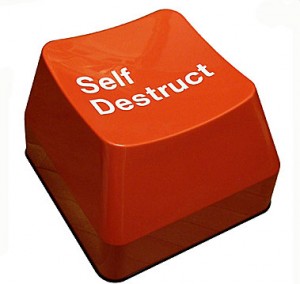Attention, attention! I have an important message to share with you: if you are an educator, you are the most important person in the building. I know you may not want to hear or read this, but your attitude and mental well-being does affect the climate of your classroom or school. I am sorry if you disagree with me, but it’s true you know. That’s a great deal of pressure and we sometimes sabotage ourselves because of self-destructive thoughts…

Sometimes our greatest enemy or barrier to success is ourselves. Past experiences, fear, doubt, or even replaying negative words of others that have been spoken to us can sabotage ideas, goals, and dreams. If this describes you, raise your hand. I’m with you and I understand.
I recently attended the Jostens Renaissance National Conference (@J_Renaissance) held in Anaheim, California July 15-17, 2011. The closing speaker was Liz Murray, author of Breaking Night. Her life story was made into a Lifetime movie titled, From Homeless to Harvard. Her story is simply amazing! As I listened to her and frantically wrote down and tweeted nuggets of wisdom that she shared with the students and educators in the audience, one message emerged loud and clear: she chose not to self-destruct. I don’t know about you, but there have been a number of times in my life when I have thought or spoken destructive thoughts or words to myself that sabotaged my dreams. Following are 10 steps I gained from her presentation that can help overcome self-destruction.
1. “No matter where we come from, we all feel like giving up.”
• Lesson-acknowledge these feelings, embrace them, and then do the opposite. This is easier said than done, but each of us has reached major and minor milestones by simply not giving up.
2. “Think about what has made a difference in your life.”
• Lesson-rely on past actions that led to successes in your life and celebrate what you’ve accomplished. Think about the process and simply apply the lessons learned.
3. “Focus on your blessings, not your faults.”
• Lesson- we are imperfect humans with a number of faults. Okay, we get it, now move on. Focusing on our blessings of family, friends, a reasonable portion of good health, teammates, and opportunities encourages us to persevere.
4. “You are already making a difference. The question is how are you making a difference?”
• Lesson- when we walk into a room the energy either goes up or it goes down. Those in the room either feel encouraged or discouraged, no one stays the same. With that in mind, when you look in the mirror or really think about whom you are, focus on the things you do that positively change lives and impact others. Self-destruction is also destructive to those with whom you interact.
5. “Don’t push off your dreams by saying, ‘I’ll do it later.’”
• Lesson- we are not guaranteed time so whatever your dreams are, write them down, establish a plan, and DO SOMETHING. Better yet, just do something and develop the plan as you go. Excuses are self-destructive and waste time. Replace the, “yeah, buts” with “yes, and.”
6. “There is always something to complain about if that’s who you want to be.”
• Lesson-choose action over talk, questions over complaints, and solutions instead of massaging the problems. You’ll be amazed by how much better you feel and how much you actually accomplish. Additionally, your circle of influence will be even greater!
7. “You never know when you are going to meet someone who is going to change your life.”
• Lesson-self destructive behaviors prevent you from being keenly aware of those around you because you selfishly focus on your faults. Open your eyes, ears, and mind to people around you. Embrace the experiences and be receptive to new ideas, new adventures, interesting books, or opportunities to serve others. Better yet, invest in other people and be the person that changes someone’s life.
8. “You don’t know what you don’t know.”
• Lesson-become a great student of yourself and others. Learn and do something new each day, week, month, and year. Live your life! If you have no pre-conceived notions or ideas of what is supposed to happen, you have no barriers holding you back and no doubt. Learn along the way and enjoy the process!
9. “The world is filled with people who tell you what you can or can’t do. You’ll know it’s possible when you are doing it.”
• Lesson-ask and answer the “what if”… question. For example, what if I run a marathon? Or what if I start journaling? What if I hug twelve people a day? You don’t know what will happen if you only think about it. There are no statues of people who simply thought great things, only of those who did great things!
10. “Ask yourself, ‘What am I most passionate about?’”
• Lesson-finding your passion provides purpose for your life. Just think about those times when you were exhausted, but you suddenly had a burst of energy when you had to do what you are most passionate about!
So what does this have to do with being an educator? Everything! As an educator you are in a position of influence which impacts students’ lives every day. Believe it or not, you are the most important person in the classroom. Embrace it and then act on it!
What are your practices to overcome self-destruction? What advice can we share?
Be Great,
Dwight
